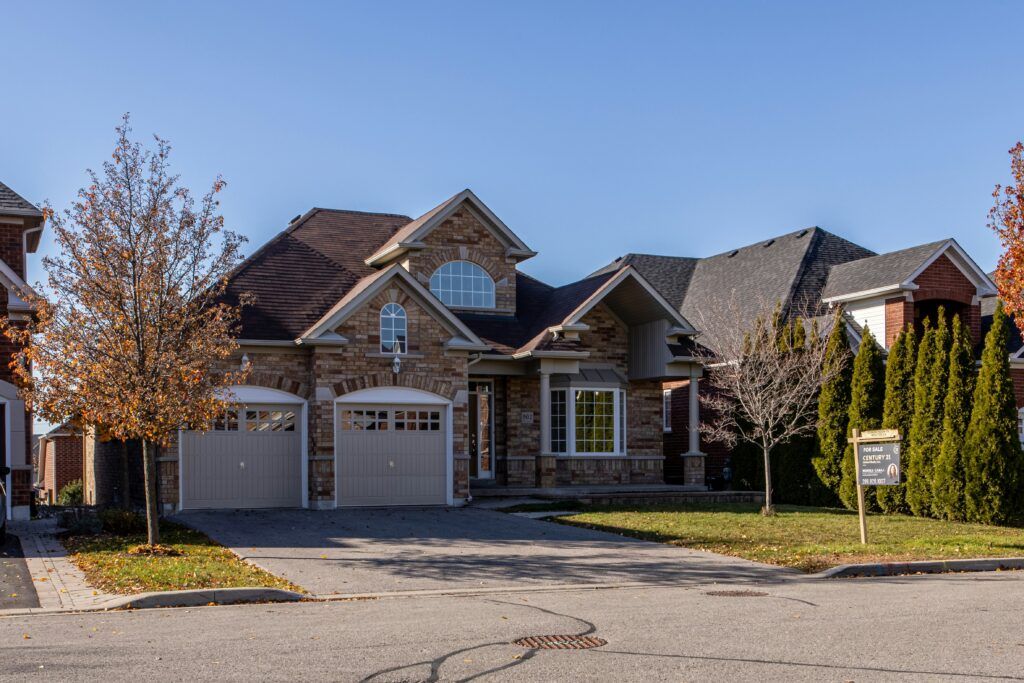- What Does “Days on Market” Mean?
- Average Time It Takes to Sell a House
- Factors That Affect How Long a House Stays on the Market
- Seasonal Trends: When Homes Sell the Fastest
- What It Means if Your Home Sale is Taking Too Long
- How to Sell Your Home Faster
- How FastExpert Real Estate Agents Help Homes Sell Faster
How Long Do Houses Stay on the Market Before Selling? Key Insights.
>>Find an Expert Real Estate Agent<<

Buyers and sellers both want to know how long houses stay on the market before selling. Buyers need to gauge how competitive their target is, and whether it’s a red flag when a house has been available for multiple weeks (or months). Sellers want an estimated timeline for moving so they can feel prepared when entering the real estate market.
This guide will help both parties learn about the average days on market in their area. While real estate trends are constantly changing, the process of researching your ideal neighborhoods does not. Here’s what you need to know.
What Does “Days on Market” Mean?
The primary metric that buyers and sellers use when discussing sale time is “Days on Market” (DOM), which refers to the number of days the house has been active on the multiple listing service (MLS). In most cases, the higher the DOM, the less desirable the property, but the DOM can also reflect local market conditions.
When looking at the DOM of a property, it is important to compare that specific parcel to the area housing market. For example, in September 2025, the national average for DOM before selling was 62 days. In some cities (or for some property types), the average DOM could be much higher or lower. Knowing the benchmark average can tell you if a house is taking longer to sell.
A high DOM compared to similar home sales in the area could indicate an issue with the home. There could be a reason that buyers aren’t making offers, either because of damage to the house or a difficult seller. While buyers can still consider the property, they should ask why it has remained on the market.
“In today’s market, well-priced homes often sell within 30 days,” says Mike Saladino, a Realtor at Keller Williams ONEChicago. “Overpriced listings or poor presentation can linger far longer—strategy matters.”
A high DOM can also be an opportunity for buyers. Homeowners typically don’t want a long selling window, especially if they are listing their primary residence. Buyers may have room to negotiate the price and contingencies in their favor if they feel the house is in good condition.

Average Time It Takes to Sell a House
The average time it takes to sell will depend on the local housing market, not national averages. For example, Seattle has one of the most competitive markets in the country. Most houses stay on the market for just nine days before the seller accepts an offer. If a house has been on the market in Seattle for the national average of 62 days, there could be problems with it.
Along with local markets, buyers need to consider the types of properties they are buying. Luxury homes tend to stay on the market longer because they have a smaller pool of buyers. Townhomes and condos have shifting demand levels regionally, and their average DOM might differ from single-family homes in your area.
This is why it is so important for a seller’s agent to provide a comparative market analysis (CMA) to homeowners. This report not only highlights the sale prices of similar properties, but also reports how long they stayed on the market.
It’s also important to remember that the DOM does not reflect the inspection, financing, and closing period.
“We don’t have the ‘put a house on the market and it sells in a week,’ market anymore, we now are seeing houses last on the market 20-30 days, or even longer sometimes,” says Andy Sabella at Addison Real Estate in Arlington, New Jersey.

Factors That Affect How Long a House Stays on the Market
Every home is affected by internal and external factors when it enters the local market. Sellers have levers they can pull to make their properties more desirable, but there’s no guarantee that buyers will submit offers. Here are a few things that affect home sale timelines and whether or not they are in your control.
1. Pricing Strategy
Pricing is one of the biggest factors that sellers control. While a real estate agent can provide a CMA and offer price recommendations, it’s up to sellers to decide their starting listing price and floor. In reality, if there is high demand for homes in the region and a quality property isn’t selling, it might be overpriced.
Competitive pricing attracts more buyers early and has the potential to speed up the home sale. Even if the home needs substantial renovations or repairs, a fair price can attract people in the market.
Consider the fair market value of your home versus the listing price. Make sure these are aligned, or your home is competitively priced. This can increase the odds that you sell quickly.
2. Location and Local Market Conditions
These two factors are entirely out of a seller’s control. The location of the property is the one thing sellers cannot change. You may live in a buyer’s market with high inventory levels or in an area where sales have gone cold.
In this case, sellers can either wait for market conditions to improve (especially if they drop off seasonally and rebound a few months later) or adjust their pricing and promotional efforts. The right choice depends on the life circumstances of the sellers and how eager they are to move.
3. Home Condition and Curb Appeal
The home’s condition will determine how many buyers want to tour the property, how many are interested in placing bids, and how many bids turn into sales. For example, a house with noticeable roof damage won’t attract as many buyers, but a home with termite damage might garner bids from buyers who walk away after reading the inspection report.
Homeowners can decide how much they want to put into repairs and improvements before entering the market. The average seller spends between $5,000 to $15,000 before listing their home. Repairs and curb improvements can be expensive, but they can also attract more buyers and potentially speed up the sale.
Consider which repairs could benefit buyers and help a deal go through. Some sellers prefer to refrain from these renovations in favor of listing at a lower price. That said, buyers will have more negotiating power because they can use the home’s flaws to request a better sale price.
4. Marketing and Visibility
This is another factor that homeowners have control over. They can hire an experienced real estate agent who takes professional photos, creates virtual home tours, and uses multiple tactics to market the property. When interviewing Realtors, ask about their promotion strategies and how they intend to get buyers to notice the home.
Home sellers can also be flexible with showing times and agree to open houses to showcase their properties. If buyers cannot access a property, they won’t know if they want to place a bid on it.
5. Mortgage Rates and Buyer Demand
This final factor is also completely out of the control of sellers. Macroeconomic conditions can reduce buyer demand and affect how many people are in the market. Sellers can decide whether they want to move now or if they can afford to stay in their homes until conditions improve.

Seasonal Trends: When Homes Sell the Fastest
Every housing market is unique, but there are a few common trends for when homes sell and when they stay on the market. Typically, the best time to list a house is during the summer months of June and July. This is when families move because kids are out of school. Consider the local school calendar to set your target listing window.
Conversely, the worst times to sell are December and January. Fewer people want to move during the holiday season or pack up their homes in the middle of winter. This means there are fewer buyers, but also fewer sellers. In some cases, this could be an opportunity for sellers to take advantage of the reduced supply.
There are some regional exceptions to these trends. States like Arizona and Florida don’t cool as much in the winter, and the housing markets tend to stay warm. It may be easier to sell in January or February in warmer states, especially if you are marketing your home to buyers escaping the snow.
What It Means if Your Home Sale is Taking Too Long
When a new home is listed, it tends to get a lot of attention from buyers looking for their ideal properties. Many MLS systems send property alerts to buyers’ agents to share with their clients, while apps like Zillow will also promote new listings. After the first week or two on the market, interest will start to fade. Sellers may have fewer showing requests and may need to take steps to rebuild interest in the listing.
If your house is taking too long to sell and interest is declining, there may be a few issues to look into:
- Pricing: You may be overpriced in the market.
- Photos: There might not be enough photos, or high-enough quality images, to interest buyers.
- Marketing: Your Realtor might not be promoting the house to the best of their ability.
- Repairs: The house might be damaged or dated to the point where buyers think it’s too much work.
The longer a house is on the market, the more buyers will suspect there is something wrong with it. This is why it’s so important to identify the barrier to sale and adjust it appropriately. This could mean dropping the price or could involve taking the home off the market, completing renovations, and relisting once you are done. Your agent should advise you on the best course of action.
“If priced aggressively, you can usually cut the marketing time, no matter what is happening in the market in general,” says Michael Tessaro, a real estate agent from Fremont, California.
How to Sell Your Home Faster
Some sellers are eager to move quickly, whether because work has transferred them or because they are losing money due to a high mortgage balance. Even if they aren’t in a rush, most homeowners don’t want to feel like their house is stuck on the market. Here are a few ways to increase the chances you move in your desired time frame.
- Have a dedicated marketing plan: make sure your Realtor takes professional photos or hires a photographer. Put your home’s best foot forward to generate interest.
- Clean, declutter, and stage: even if you don’t make major renovations, show a clean house with unnecessary items removed. Ask your agent if they recommend staging your property.
- Price your house correctly: Overpricing is one of the biggest ways to delay a home sale. It can keep a house on the market longer than you want. Review CMAs to get an idea of your realistic price range.
- Be flexible with showings: Let people see your house. It is reasonable to request 24 hours’ notice to prepare the house.
Finally, make sure you trust your agent. Feel confident that your Realtor is using accurate data and modern selling tools to get buyers excited about your home.
“In Silicon Valley, homes move fast — so fast your head will spin,” says Julie Wyss at Keller Williams Bay Area Estates in Los Gatos, California. “We handle inspections upfront and position for non-contingent offers, skipping renegos, repairs, and credits. No wasted time.”
How FastExpert Real Estate Agents Help Homes Sell Faster
At FastExpert, we understand that sellers can’t wait for months to attract buyers, which is why we search for experienced, skilled agents who can promote properties and generate deals. Sellers can read agent profiles and request interviews to meet top candidates. Buyers can also find agents who can help them make competitive offers and tour new properties.
Connect with a top-rated agent on FastExpert to learn more about your neighborhood and develop marketing and pricing strategies to sell. The entire process is free for buyers and sellers alike.





